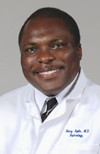Ayiku attracted to research in
Nephrology
by
Heather WoolwinePublic Relations
Henry Ayiku, M.D., didn’t always know that he wanted to be a doctor, but a lot of intense reading of health care articles and journals in high school set him on his present path.
 Dr. Henry Ayiku
Dr. Henry Ayiku“I knew that I didn’t want to be an engineer like my father, and once I began reading all those articles and seeing what it is that physicians do, especially in an academic medical center, I just knew that even one of these things (patient care, education, or research) I would have fun doing,” said the new assistant professor in the Department of Medicine Nephrology division. “I knew it would be hard to get burnout with so many different things and that’s what it was, the diversity of this profession. The diversity of being able to treat conditions, help people, teach and do research just made it even more interesting.”
Ayiku received his medical degree from the University of Ghana Medical School in Accra, Ghana. A native of that same country, he then traveled to St. Barnabas Hospital in Bronx, N.Y. , for his internship and residency with the Cornell Medical Center affiliate. It was after finishing his residency that he met Steve Foster, M.D., who encouraged him to pursue his dream and told him about the excellent research program in the MUSC Nephrology division.
“He put me in touch with Dr. (John) Raymond in nephrology, and we had a great discussion. Proteomics was the next big thing and MUSC was ready to go forward in that area,” Ayiku said.
By 2003, Ayiku arrived on campus as a nephrology fellow. His first two years were a research-focused course of study followed by a third year of clinical work. Ayiku said that his interest in nephrology was spawned from a comparison of conditions in the United States and Ghana for patients with kidney disease. “When I was doing my residency in New York, I saw a whole different situation than what I had experienced in Ghana,” Ayiku said. “In Ghana, only a limited number of patients can get dialysis and no one is performing kidney transplants over there. Part of the pull to nephrology was that there were so many interesting things to learn in that area that I hadn’t been exposed to in Ghana. The kidney is very fascinating because its function affects all the other organ systems.”
When it came time for the chief nephrology fellow to job-hunt, MUSC was at the top of his list. “While I was in the lab, I was able to work with Dr. (John) Arthur on proteomics and Dr. Raymond on cell-signaling. The idea is to apply proteomics to cell signaling and they were interested in growing that area of research,” Ayiku said. “Using proteomic techniques, we want to be able to predict how a transplanted kidney will function after transplant. For example, we might be able to identify certain proteins or other biomarkers that tell us certain things, like when a person is likely to reject a kidney or how long a transplanted kidney will function before failing. We want to know if there are any biomarkers; are they affected by other factors and how this could all help us to extend the life of a transplanted kidney and/or improve the quality of life for people whose kidney fails,” said Ayiku, who currently is focused on transplant nephrology.
A believer in the MUSC three-pronged mission of patient care, research, and education, Ayiku said he loves to teach fellows and medical students and relishes that aspect of his profession. The soccer enthusiast also is interested in becoming involved in outreach efforts to help his countrymen once the dust settles on his new duties.
Ayiku resides in Mount Pleasant with his wife, Jovia, and three children: Beryl, 5, Pearl, 3, and Kofi, 1.
Friday, Aug. 25, 2006
Catalyst Online is published weekly,
updated
as needed and improved from time to time by the MUSC Office of Public
Relations
for the faculty, employees and students of the Medical University of
South
Carolina. Catalyst Online editor, Kim Draughn, can be reached at
792-4107
or by email, catalyst@musc.edu. Editorial copy can be submitted to
Catalyst
Online and to The Catalyst in print by fax, 792-6723, or by email to
catalyst@musc.edu. To place an ad in The Catalyst hardcopy, call Island
Publications at 849-1778, ext. 201.